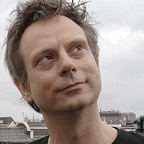Evgeny Morozov inspiring a balancing of viewpoints
This evening I attended a debate session in De Balie organized around the Dutch introduction of the book by Evgeny Morozov: To Save Everything, Click Here. The writer was present to kick-off the discussion. Three others played the role as referent (Hans de Zwart, Linnet Taylor, Dimitri Tokmetzis). It became interesting as the floor was opened to the audience. I am not reporting on the session in detail, you can rewatch the whole piece if you want.
The value of the work of Morozov and this debate is not his standpoints as such, but it is the discussion it triggers. For me two important concepts are linked (and I don’t mean to be complete in the analysis, these are mine main observations).
First is the notice we have entered a state of total digital life. We are post digital and beyond mobile. We live our life like it is digital, in our behaviour, in our expectations. Next step is the connection with the real world, the creation of ‘solid’ touchpoints, tangible interactions. This is the solid internet. In Morozov’s world he is opposing the technology as solutionism for everything. He propose to think technology as part of our life, as something to live with, not to live by. We need not to be servants to technology, not to be pure slaves to data optimised behavior, we need to keep thinking. Something I agree upon.
Secondly we need to think how to react. We need to master this digital life, to learn and have literacy to play the system. We live in a world that becomes more and more defined in rules, adapting to our behaviour, but also trying to influence our behaviour.
We can fight this situation by ignoring technology, but I think it is a better strategy to learn to master this world. We will have a continuum of virtual reality that we can manipulate. The smart ones will generate ghost-presences, will learn how to bend the rules.
So we need to learn how to play. And we need to be aware how digital and physical layers interfere and add on. This is not something we can master in one iteration, this will take more like a generation. To help understand and learn is the important part of thinkers as Morozov. The biggest danger is the rhetoric and polarisation. I value Morozov as inspiration for this thinking, not as the end stage of an ideology.
